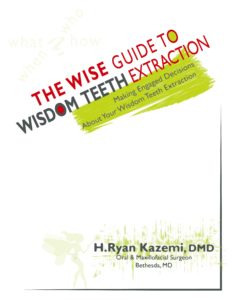 Swelling after extraction of impacted wisdom teeth is a common occurrence. It usually reaches its maximum in 48 hours after surgery. It gradually diminishes in 7-10 days with almost complete resolve in 14 days. But what causes such swelling, and how can we minimize it?
Swelling after extraction of impacted wisdom teeth is a common occurrence. It usually reaches its maximum in 48 hours after surgery. It gradually diminishes in 7-10 days with almost complete resolve in 14 days. But what causes such swelling, and how can we minimize it?
Contrary to common belief, wisdom teeth extraction does not cause swelling. The reflection of gum tissue flap and bone removal is responsible for post-operative swelling. So swelling can be minimized or even prevented by avoiding broad reflection of the gum tissue and removing bone utilizing micro-incision techniques. This technique is undoubtedly more challenging to perform and requires excellent skills by the surgeon; however, it has a remarkable impact on patients’ recovery and overall experience.
For this technique, I use a small incision to uncover the top of the impacted wisdom tooth with a minimal gum tissue flap within the crest of the ridge. Then, I use a small surgical drill to expose the tooth and create a small access window gently. Next, I section the tooth in multiple vectors and remove each segment gently with a micro elevator. This way, the wisdom tooth can be removed gently with little or no pressure on the surrounding tissues. Finally, the site is irrigated and closed with one suture. For faster healing, I also place platelet-rich fibrin obtained from 1 tube of the patient’s blood.
This technique lessens swelling and pain after surgery which can be relieved by common over-the-counter medications.
More extensive access may be required to manage severely impacted wisdom teeth. In such circumstances, patients will experience more swelling, which can be minimized with IV steroids and ice for 24 hours.
Dr. Kazemi is a board-certified oral and maxillofacial surgeon in Bethesda, MD
